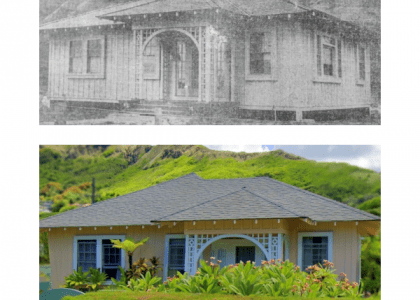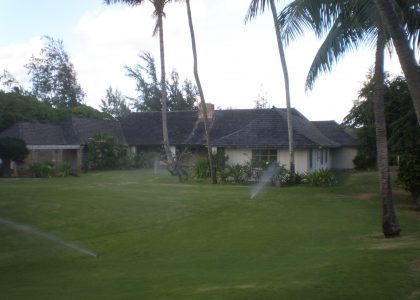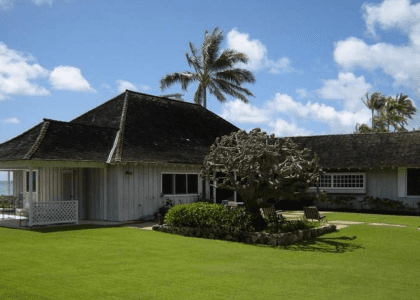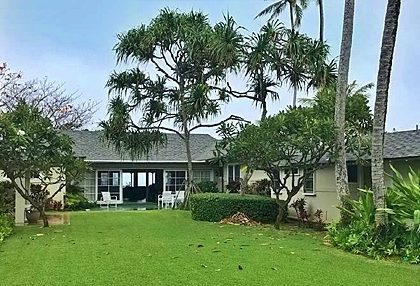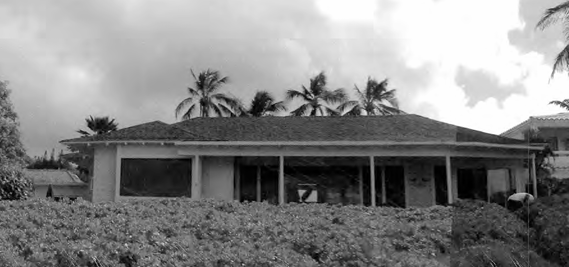
The Andrade Beach Retreat is located between Mokulua Road and Lanikai Beach on Oahu’s windward side. Nestled among luxury homes, it is one of the few remaining places still inhabited by the original family that purchased the land from Charles Frazier’s Town & Country Homes during the 1920s and 1930s.
This retreat reflects the low-key characteristics of the original neighborhood development in Lanikai. The home is modest in size and surrounded by a large lawn, as all original homes were built. The original deeds specified that buildings needed a buffer from their property lines. However, after these restrictions lapsed in 1950, many properties in Lanikai encroached on the greenspaces. As a result, trees, plants, and short fences were removed for privacy, and tall walls were constructed.
The Andrade Beach Retreat is historic not merely because it was built nearly 100 years ago but also because it is intimately connected to the Andrade family.
The Andrade Family: A Portrait of Resilience and Community in Hawaii’s History
The story of the Andrade family embodies Hawaii’s rich cultural diversity. It reflects the broader journey of Portuguese immigrants to the islands and their lasting contributions to the state’s history and identity. From their origins in Madeira, Portugal, to their integration into Hawaii’s growing communities, the Andrade narrative illustrates resilience, entrepreneurship, and a profound connection to land and family.
The Portuguese in Hawaii: Seeking Opportunity
In the late 19th century, Madeira’s economic hardship and agricultural decline motivated many Portuguese families to seek better opportunities abroad. Hawaii’s sugar industry and its demand for human labor attracted thousands of immigrants to the islands. Between 1878 and 1888, over 11,000 Portuguese immigrants arrived, bringing a strong work ethic, cultural traditions, and aspirations for a better life.
Among these immigrants was Joaquin Jose Andrade, who left Madeira, spent years in British Guiana, and finally settled in Hawaii in the late 1880s. He married Carolina Teixeira Brazao, and together, they raised seven children who would become a prominent family in Hawaii’s history.
Building Community in Honokaa
The Andrade family established a significant presence in the Honokaa community on the Big Island. Joaquin’s son, Joao Jose Andrade, contributed to the town’s development by founding a slaughterhouse, a gas station, and the Honokaa Clubhouse.
The Andrades’ influence extended beyond business. Alfred Jose Andrade was involved in local organizations like the Catholic Church and the Hawaii Saddle Club. This commitment to civic duty and community engagement became a hallmark of the Andrade legacy.
Expanding Horizons: Dr. James Joseph Andrade
James Joseph Andrade, one of Joao Jose Jr.’s nine children, took a different path by becoming the first island-born chiropractor licensed in Hawaii. His pioneering spirit mirrored the aspirations of his parents and grandparents, who sought to improve their circumstances through education and innovation.
Dr. Andrade’s successful chiropractic practice in Honolulu enabled him to invest in property during Lanikai’s early development. He partnered with other Portuguese-American investors to create leasehold subdivisions, providing opportunities for first-time homeowners. These efforts were crucial in shaping the modern Kailua area, particularly the Enchanted Lake community.
A Family Legacy Rooted in Hawaii
The Andrade family exemplifies the enduring influence of Portuguese immigrants on Hawaii’s development. Their dedication to community—from the rural town of Honokaa to the developing neighborhoods of Kailua—illustrates the immigrant experience in Hawaii. Their story reflects values of hard work, adaptability, and the importance of preserving cultural roots while welcoming new opportunities.
Lanikai History
Today, the Andrade beachfront home in Lanikai is a testament to this legacy, symbolizing the family’s achievements and the enduring spirit of the immigrant communities that have enriched Hawaii for generations.
Sources
Gusrini, E., Efi, A., & Fitrisia, A. (2024). Cultural Identity: The Symbols, Meaning, and Interpretation of Bakar Tongkang Tradition. https://doi.org/10.22437/irje.v8i1.33192
Minatoishi, L. (2012). Andrade Beach Retreat National Register of Historic Places Registration Form.

